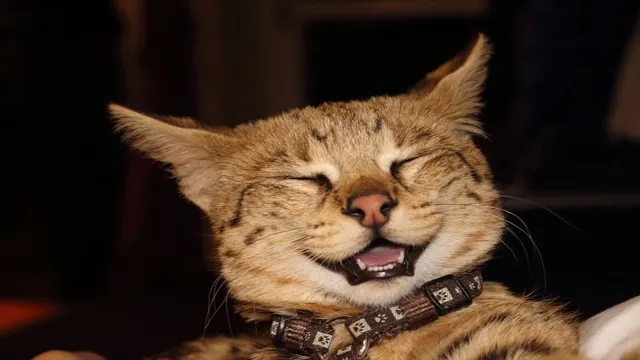Savannah Cats are captivating and unique feline companions, cherished by cat enthusiasts around the world for their striking appearance and engaging personalities. In this comprehensive guide, we'll delve into the world of Savannah Cats, exploring their history, distinctive features, and what it takes to be a responsible owner.
So, let's embark on a journey to unravel the mystery of Savannah Cats, from their origins to the care and maintenance that ensures their well-being.
The Savannah is a hybrid cat breed. It is a crossbreed between an African serval and a domestic cat. Savannah cats have tall and slim bodies with large ears.
Savannahs are a newer breed beginning in the late 80’s, and the breed grows more breeders worldwide are mating an African serval to a domestic cat successfully.
Description: Savannah Cat
Savannah Cats are a crossbreed between a domestic cat and the serval, a wild African feline. Their name is derived from the African savannah, where the serval is commonly found. This unique combination of domestic and wild genetics results in a stunningly exotic appearance. Savannah Cats are known for their tall, slender bodies, elongated necks, and striking spotted coats, reminiscent of their serval ancestors.
Although later generations of the breed are similar in weight to other breeds, they appear larger due to their height. Savannah Cats are characterized by their long, slender necks, triangular heads, and large, wide ears that sit on top of their heads. They also have longer-than-average legs. Exposure to friendly atmospheres with positive reinforcement work best. These cats are not comparable to Bengal cats. Bengal cats have an opposite body structure to the Savannah cat.
- Savannah Cat Lifespan: 12-20 years.
- Savannah Cat Weight: 12-25 pounds.
- Exercise: High.
- Are Savannah Cat Hypoallergenic : No.
Savannah Cat Personality
The character of this cat is playful, adventurous, and loyal. So these cats love to play in the water and can be trained to walk on a rope and play.
These cats have great hunting instincts, so they aren’t always suitable for households with pets like fish, hamsters, and birds. Her temperament is mild, though, so she’s a great companion to other cats and dogs, children, and other humans in her home with proper socialization as a kitten.
Because of their playful nature, however, they may get into a mess and need a bath. Fortunately, they love water!
Feeding & Grooming
Feeding: These cats grow at a fast rate so proper nutrition is vital. These cats do not require a raw meat diet but if you cook raw meat it is the most nutritional diet. Work with your veterinarian and breeder to determine the frequency of meals.
Grooming: These cats are a lower-shedding breed, and so they require less grooming than long-haired breeds.
Savannah Cat Care
Caring for a Savannah Cat requires attention to their specific needs to ensure their well-being and happiness:
- Affection and Interaction: Savannah Cats thrive on human interaction. Spend quality time with your cat to foster a strong bond.
- Regular Veterinary Care: Routine check-ups with a veterinarian who is familiar with exotic cat breeds are crucial to monitor their health.
- Diet: Savannah Cats have unique dietary requirements. High-quality cat food is essential, and some owners choose to supplement their diet with raw meat to mimic their wild diet.
- Exercise: These cats need daily exercise and mental stimulation. Interactive toys, puzzle feeders, and play sessions can help keep them active.
- Secure Environment: Due to their curious nature, Savannah Cats require a secure environment. Fenced-in yards or enclosed outdoor spaces are ideal to prevent them from wandering.
FAQs
Q: Are Savannah Cats good with children?
A: Savannah Cats can be great with children when socialized properly. They are playful and enjoy interaction.
Q: Are Savannah Cats good with children?
A: Savannah Cats can be great with children when socialized properly. They are playful and enjoy interaction.
Q: Are Savannah Cats hypoallergenic?
A: While they are not completely hypoallergenic, many people with allergies find Savannah Cats to be more tolerable.
Q: How long do Savannah Cats live?
A: On average, Savannah Cats have a lifespan of 12-20 years with proper care.
Q: Do Savannah Cats require a lot of grooming?
A: They have low-maintenance coats, and brushing them occasionally is usually sufficient.
Q: Are there any legal restrictions on owning a Savannah Cat?
A: Ownership laws vary by location, so it's essential to check your local regulations before acquiring a Savannah Cat.
Conclusion
In conclusion, Savannah Cats are an exceptional breed that combines the beauty of a wild African cat with the companionship and affection of a domestic feline. Their unique characteristics, history, and care requirements make them a fascinating choice for cat lovers.
By understanding their specific needs and providing a loving, secure environment, you can enjoy the company of these extraordinary cats for many years. Savannah Cats are not just pets; they are exotic, loyal companions that bring joy to their owners.

